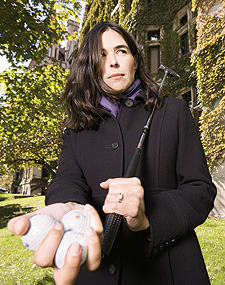|
Photograph: Hayley Murphy |
|
Sian Beilock on campus
|
THE DOCTOR University of Chicago psychology professor Sian Beilock, 30
WHY THERE IS A PUTTING GREEN IN HER OFFICE In her initial research, Beilock discovered that top students and athletes choked under pressure and with more frequency than their less talented counterparts. So she set up a series of experiments to understand why. In one, she brings in a golfer and tells him that pros will watch tapes of his putts. In another, she promises someone calculating math problems that a good score will earn her a few dollars. “It’s always amazed me how small snippets of perfor-mance can really dictate what teams you make, what schools you get into, what kinds of scholarships you get,” she says. “People don’t always perform at their best in [high-pressure] situations.”
WHY THE BEST AND BRIGHTEST ARE MOST LIKELY TO CHOKE The best math students have a high level of what Beilock calls “working memory,” which allows them to puzzle through problems. Pressure eats into that facility, causing the best students to drop near, or even below, the level of peers who rely more on educated guesses and rote memorization. This has serious implications for interpreting high-stakes test results, since students who typically ace classroom exams will often score in a lower percentage than expected under pressure. That low score could cost a deserving student a college acceptance letter or a scholarship.
“It’s not that it just pushes everyone down,” Beilock says. “That wouldn’t be so horrible.”
Similarly, in the sports world, pressure causes athletes to stop and think. For novices, that is often a bonus. But top golfers get fouled up when they contemplate their swing. After years of honing, it’s best for familiar actions like a simple putt to run on autopilot. You don’t need to be a pro to understand this. “If you think about your knees when you’re walking down the stairs, you may fall on your face,” Beilock says.
WHAT SURPRISES HER MOST How easy it is to stress people out. The mere promise of $5-or the presence of a video camera-causes subjects to falter. Negative stereotypes can elicit this same effect. With a strong female math student, if Beilock says she’s exploring why women are worse at math than men, the woman will score poorly. If she tells white men that they’re being tested to learn why Asians outperform them, they too will choke.
HER ADVICE TO THE PROS It turns out that your parents were right-most of the time. Students taking high-pressure tests should practice, practice, practice. Knowing the problems inside out means not calling upon working memory, which is hurt by stress. Practicing under pressure is a good strategy for both scholars and athletes. For example, Beilock says, instead of letting a basketball team casually shoot free throws in practice, a coach could insist that an excess of flubbed shots means the whole team runs a lap.
For skilled athletes, the key is to avoid overthinking. Nike, it turns out, was really on to something: If your body knows how to putt or swing or score, then “just do it.”
DOES SHE TAKE HER OWN ADVICE? A competitive lacrosse player since college, Beilock sings to herself on the field as a distraction from the pressure. Her pick: “Take It Easy,” by the Eagles.



